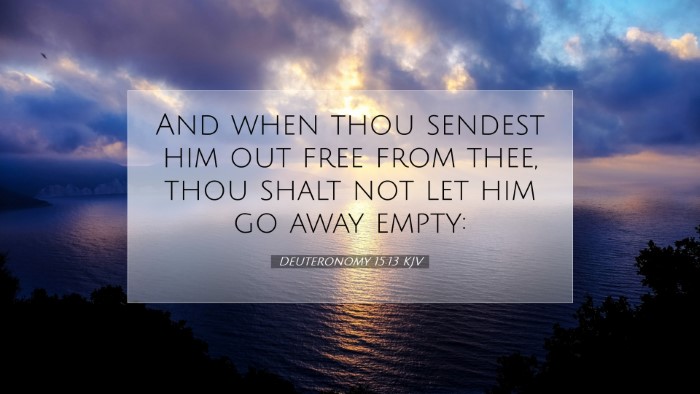Commentary on Deuteronomy 15:13
Verse Text: "And when you send him away free from you, you shall not let him go away empty-handed."
Contextual Overview
Deuteronomy 15 is a significant chapter in the Pentateuch, emphasizing principles of generosity, release, and social justice. This instruction regarding the release of enslaved individuals is rooted in the overarching themes of mercy and provision that characterize God's covenant with Israel.
Exegetical Analysis
Deuteronomy 15:13 is deeply intertwined with the concept of the Hebrew slave's release after six years of service. This divine mandate serves to underscore the dignity of the individual and the importance of ensuring they are not sent away in a state of need.
Commentary Insights
- Matthew Henry: The renowned commentator emphasizes that the act of releasing a servant should be accompanied by generosity. He interprets the command as a moral obligation, reflecting God's own grace toward His people. Henry asserts that the Israelites are to reflect this grace in their treatment of servants.
- Albert Barnes: Barnes expounds on the socio-economic context of the time. He notes that sending away a freed servant without provisions would imply a neglect of charity. The act of providing for the dismissed servant ensures their survival and reintegration into society, thus promoting communal responsibility.
- Adam Clarke: In his commentary, Clarke draws attention to the historical and cultural significance of liberating a servant. He elucidates that the Israelites, having experienced oppression in Egypt, should extend kindness and understanding to those in similar circumstances. Clarke asserts that this provision underscores a system of mutual care within the community.
Theological Interpretation
This verse calls pastors and theologians to explore the implications of freedom and provision in their ministries. Theologically, the text can be seen as an embodiment of God's character—He is both a liberator and a provider. This duality is essential for understanding the nature of salvation and grace in the Christian faith.
Principles of Generosity
- Compassionate Action: The mandate encourages compassionate action towards those who have served, compelling believers to offer tangible support upon their release.
- Social Responsibility: It reinforces the responsibility of the wider community to care for individuals, promoting an ethos of shared well-being.
- Reflection of Divine Grace: The command to send the freed servant away with gifts mirrors God's generosity towards humanity, positioning believers to reflect God's goodness in their relationships.
Application for Modern Believers
The implications of Deuteronomy 15:13 resonate deeply in contemporary Christian practice. Here are some applications for modern believers:
- Humanitarian Efforts: Believers are encouraged to support humanitarian and outreach programs that provide aid to the vulnerable and marginalized in society.
- Support for Those Leaving a Difficult Past: Churches can take initiative to assist individuals transitioning out of adversities, such as addiction recovery or personal crises.
- Encouraging a Culture of Generosity: Pastors are urged to cultivate a culture where generosity and kindness are modeled and practiced regularly within the church community.
Conclusion
Deuteronomy 15:13 serves as a rich source of ethical and theological reflection. By examining the insights of Matthew Henry, Albert Barnes, and Adam Clarke, one discerns a robust framework of divine expectation towards the treatment of others, especially those who have experienced hardship. As such, this verse is more than a historical command; it acts as a compelling call to live out the values of compassion, community, and generosity in every believer's life.


